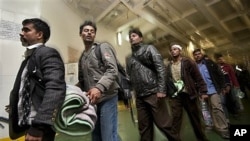U.S. officials said Monday that more than a half-million people, most of them third-country nationals, have fled Libya since the uprising against Moammar Gadhafi's government began in February. And they say about 5,000 people are joining the exodus every day.
Officials here say the outflow is affecting all six countries bordering Libya, but with the burden failing mainly on Tunisia and Egypt.
They say that to help cope with it, the world community, led by U.N. agencies, has mounted one of the largest humanitarian airlifts in history.
Senior officials at the State Department and the U.S. Agency for International Development, or USAID, who briefed reporters on Monday said an estimated 550,000 people have fled Libya since fighting began.
They said the outflow consists largely of third country nationals who had been working there, but also includes Libyans fearing for their safety, and refugees from conflicts in Sudan and Eritrea who had been given shelter by Libya.
Deputy Assistant Secretary of State for Population, Refugees and Migration Reuben Brigety said that as of Monday, 117,000 people have been airlifted home to countries as far away as Bangladesh and Vietnam.
He said the charter flights, organized by the U.N. High Commission for Refugees and the International Organization for Migration, or IOM, are intended to ease the strain on Tunisia and Egypt.
"For both Tunisia and Egypt, you’re talking about two countries that are both very fragile politically at the moment, that have both undergone their own recent transitions," said Brigety. "So what we’ve tried to do is to continue to have the air bridge maintained, so that you don’t have large number of third country nationals build up in camps and create the sorts of security problems that those sorts of populations might create."
Brigety said the airlift has been partially underwritten by a $13 million U.S. contribution to the IOM, part of the overall $47 million the United States has committed to humanitarian assistance related to the Libya conflict.
That figure is separate from the $25 million in non-lethal assistance, including medical supplies, body armor and radios, the Obama administration pledged to Libyan rebels last week.
Officials here say the first U.S. food aid commitment for Libya, consisting of more than 800 tons of beans and cooking oil, arrived Monday at the Egyptian port of Alexandria for shipment to relief centers near and inside Libya.
Food and other relief supplies are being dispensed in Libya by international agencies. The State Department's Reuben Brigety said it is important that aid deliveries remain impartial and not be associated with either side in the conflict.
"The U.N. Office for the Coordination of Humanitarian Assistance, UNOCHA, has consistently said that they do not see a need for military support for delivery of humanitarian assistance inside Libya at this point," added Brigety. "They continue to ask for respect for the Oslo Guidelines, which call for the use of military assistance only as a last resort. And we certainly have not had any indication that humanitarian assistance will be required to be delivered under armed escorts at the moment."
USAID has a small team of officials in the Libyan rebel stronghold of Benghazi to coordinate with the opposition Transitional National Council on aid needs in areas it controls. A senior State Department envoy, Chris Stevens, handles U.S. political contacts with the TNC.
Libya Conflict Has Displaced 550,000 People















